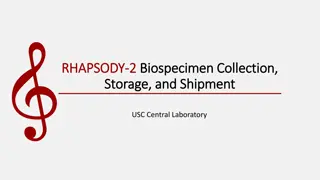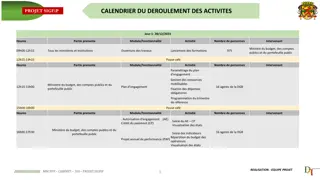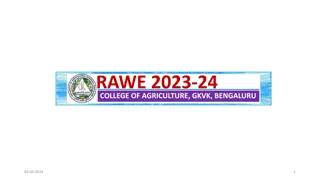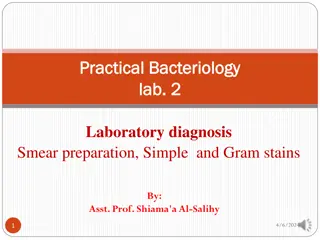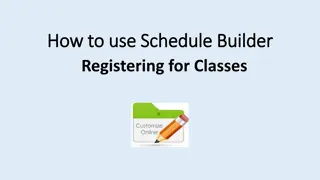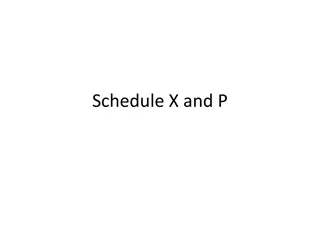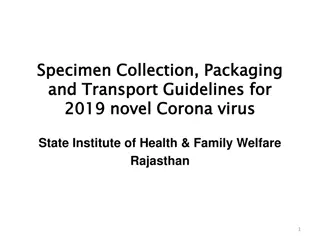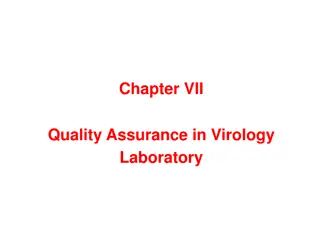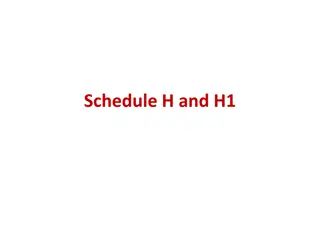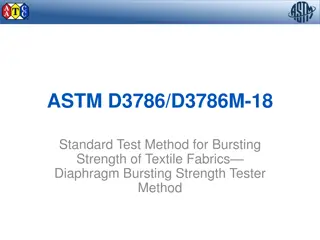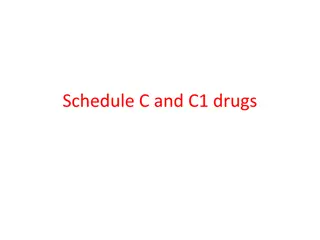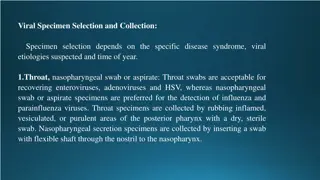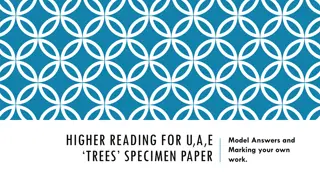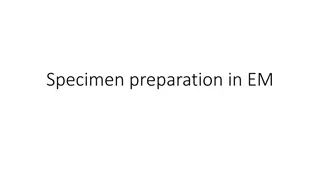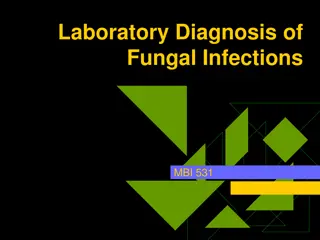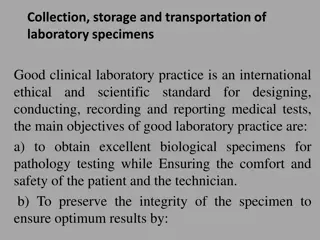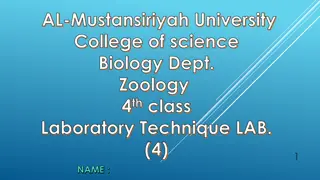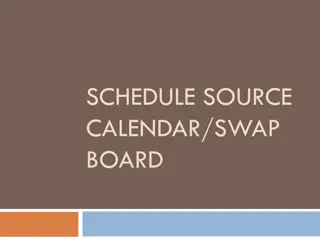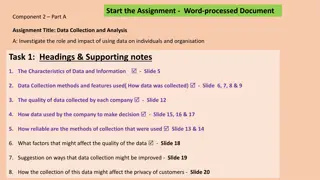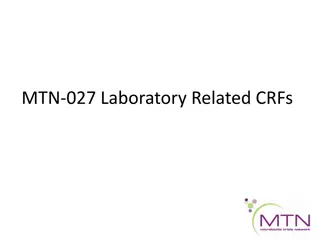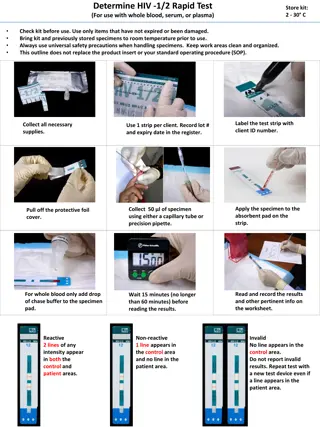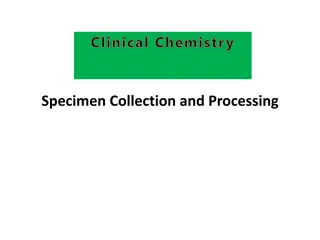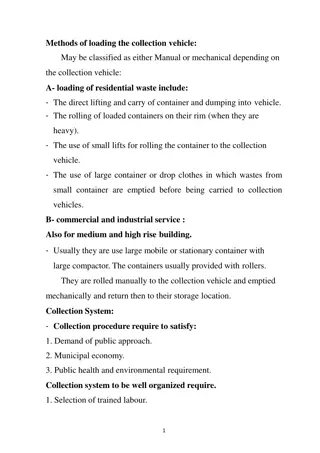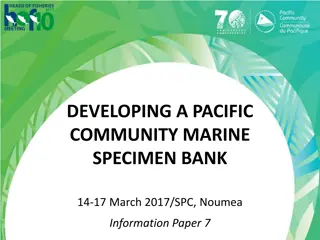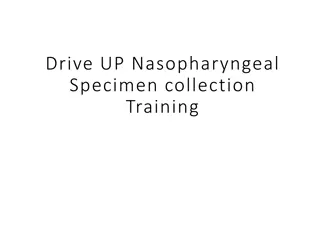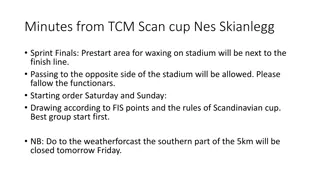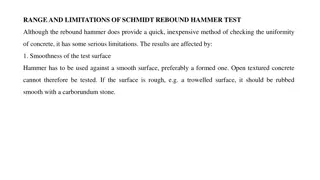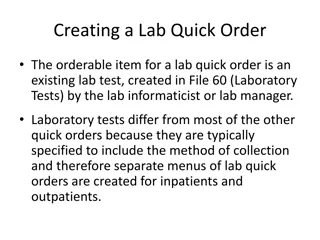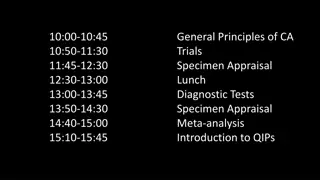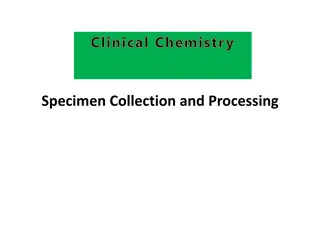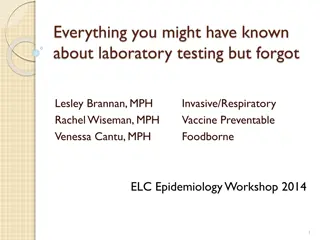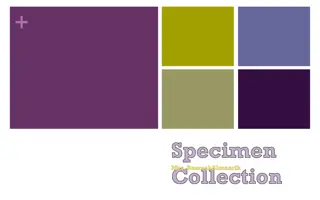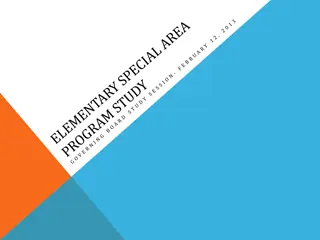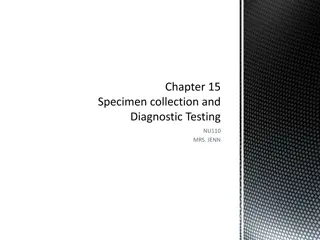Biospecimen Collection, Storage, and Shipment Overview at USC Central Laboratory
This overview covers the types of biospecimens collected, specimen collection schedule, supplies, protocols, and shipping instructions at the USC Central Laboratory. It includes details on whole blood collection for different assays, storage procedures, and shipment to USC Labs and Charles River Lab
0 views • 21 slides
Project SIGFiP Activities Schedule
The project activities schedule for SIGFiP includes detailed plans and activities for Day 1 and Day 2, featuring key stakeholders, modules, functionalities, activities, and participants. The schedule outlines engagements, budget management, resource allocation, and performance evaluation. It provide
3 views • 18 slides
Tentative Schedule of Events for College of Agriculture 2023-24 in Bengaluru
The provided content outlines the tentative schedule of events for the College of Agriculture in Bengaluru for the academic year 2023-24. It includes details such as orientation programs, placement opportunities, project report preparation, and student demographics. The schedule encompasses various
1 views • 14 slides
Practical Bacteriology Laboratory Diagnosis and Sample Collection
This practical guide focuses on laboratory diagnosis steps in bacteriology, covering specimen collection, microscopic examination, culture tests, biochemical tests, serological tests, and molecular tests. Learn about various sample collection methods for urine, stool, swabs, sputum, pus, CSF, and mo
3 views • 23 slides
World Boxing Technical Meeting Agenda and Event Schedule
The technical meeting for the World Boxing event on April 15 at 2:30 PM includes essential information such as participation details, eligibility requirements, event schedule, and preliminary competition schedule. Key personnel and contact information are provided, along with a roll call of particip
8 views • 25 slides
Guide to Using Schedule Builder for Class Registration
Explore the functionalities of Schedule Builder, a web-based program that helps you plan, build, and compare class schedules, alongside tips and insights for successful registration and schedule management. Learn how to access, navigate, and utilize Schedule Builder effectively to streamline your cl
0 views • 17 slides
State of Wisconsin Document Upload and Appointment Scheduling Guide
This comprehensive guide provides step-by-step instructions on how to upload documents for the State of Wisconsin, login to DaySmart Appointments, create interview schedule links for various regions and agencies, obtain the 4-digit schedule ID number, and includes instructions for creating schedule
0 views • 8 slides
Drug Storage and Dispensing Regulations
Descriptions and guidelines for Schedule X, Schedule P, Schedule P1, dispensing prescriptions, drug storage conditions, and requirements for selling substances specified in Schedules H, H1, and X. Includes details on drug potency, storage temperatures, pack sizes, habit-forming drugs, and narcotics.
0 views • 10 slides
Understanding Differential Leucocyte Count for Blood Disorders
Differential Leucocyte Count (DLC) is crucial for diagnosing blood-related disorders by analyzing the distribution and morphology of white blood cells. Dr. Versha Prasad explains the significance, normal values, and various conditions like neutrophilia, lymphocytosis, monocytosis, and basophilia. Th
1 views • 15 slides
Guidelines for 2019 Novel Coronavirus Specimen Collection
The guidelines outline the responsibilities of clinicians in collecting clinical specimens for testing 2019-nCoV, emphasizing the importance of following case definitions and using proper procedures for specimen collection, packaging, and transport. It also provides details on selecting patients for
0 views • 14 slides
Quality Assurance in Virology Laboratory
This chapter focuses on quality assurance in virology laboratory, covering topics such as quality control, documentation of test results, laboratory safety rules, and more. It explains the types of quality control, quality assurance cycle, and process areas of quality assurance in laboratory testing
3 views • 19 slides
Understanding Schedule H and Schedule H1 Drugs
Schedule H and Schedule H1 drugs are categories of prescription medications with specific regulations regarding their supply, labeling, and sale. While antibiotics, anti-TB drugs, and habit-forming substances have been categorized under Schedule H1, both schedules require maintaining records of sale
1 views • 14 slides
ASTM D3786/D3786M-18 Standard Test Method for Bursting Strength of Textile Fabrics
This standard test method, ASTM D3786/D3786M-18, specifies the procedure for determining the bursting strength of textile fabrics using a diaphragm bursting strength tester. The test involves clamping the specimen over an expandable diaphragm and applying pressure until the fabric ruptures. The burs
0 views • 16 slides
Overview of Schedule C and C1 Drugs and Licensing Requirements
Schedule C and C1 drugs in India require specific licenses for manufacturing, distribution, and retail selling. Schedule C covers biological and special products like vaccines and insulin, while Schedule C1 includes other special products such as fish liver oil and vitamins. Licensing authorities is
1 views • 14 slides
Viral Specimen Selection and Collection Overview
Specimen selection for viral testing depends on the suspected viral etiologies and disease syndrome. Throat and nasopharyngeal swabs are used for different viruses, while rectal swabs, urine, blood, and tissue samples are also collected for specific viral detection. Proper specimen transport and sto
0 views • 7 slides
Higher Reading for UAE Trees Specimen Paper Model Answers
This specimen paper provides model answers and guidance on marking your own work for a higher reading exam focusing on trees in the UAE. The questions cover various aspects such as identifying key points, analyzing language choices, and interpreting the writer's perspectives on environmental issues.
0 views • 32 slides
Understanding Specimen Preparation in Electron Microscopy
Living things cannot survive in an electron microscope due to the high temperature generated by the electron beam, vacuum inside the microscope, and need for specimen preparation steps like fixation, dehydration, freezing, cutting, and mounting. Fixation involves stabilizing tissue with chemicals, d
3 views • 10 slides
Laboratory Diagnosis of Fungal Infections: Specimen Collection and Transport
In the laboratory diagnosis of fungal infections, proper collection and transportation of specimens are crucial for accurate diagnosis and treatment. Different sites and types of specimens require specific collection techniques to avoid contamination and ensure viability. From superficial to systemi
0 views • 29 slides
Best Practices for Clinical Laboratory Specimen Handling
Good clinical laboratory practice emphasizes the proper collection, storage, and transportation of laboratory specimens to ensure accurate and reliable test results. Key aspects include obtaining high-quality specimens, maintaining specimen integrity, and following standard precautions to prevent co
6 views • 6 slides
Common Laboratory Techniques in Zoology - Urine and Stool Specimen Analysis
In the Biology Department at Al-Mustansiriyah University, students learn laboratory techniques for collecting and analyzing urine and stool specimens. The process involves random urine sample collection, urine tests for chemical components, urine culture, stool specimen analysis for pathological con
0 views • 10 slides
Manage Your Work Schedule Efficiently with Schedule Source Calendar Swap Board
Access your work schedules through Schedule Source to easily find substitutes for work shifts posted on the swap board. Simply log in to your personal portal, view your schedule on My Calendar, and learn how to put shifts on the swap board or pick up available shifts. Stay organized and stay in cont
0 views • 14 slides
Understanding Data Collection and Analysis for Businesses
Explore the impact and role of data utilization in organizations through the investigation of data collection methods, data quality, decision-making processes, reliability of collection methods, factors affecting data quality, and privacy considerations. Two scenarios are presented: data collection
1 views • 24 slides
Laboratory Related CRFs for Pharmacokinetics Study
This collection encompasses various CRFs related to laboratory procedures in the context of Pharmacokinetics for a study. It includes forms for enrollment, specimen storage, safety laboratory results, and specific days for sample collection. The CRFs detail the storage, collection, and documentation
0 views • 14 slides
HIV Rapid Test Procedures and Instructions
This content provides detailed instructions for conducting HIV rapid tests using three different kits: Determine HIV-1/2 Rapid Test, Uni-Gold HIV-1/2 Rapid Test, and Bioline HIV-1/2 Rapid Test. The instructions include steps such as specimen collection, test device preparation, result interpretation
0 views • 5 slides
Proper Clinical Chemistry Specimen Collection and Processing
Proper collection, identification, processing, storage, and transport of various types of biological specimens are crucial for obtaining accurate diagnostic test results. Different types of specimens, such as whole blood, serum, plasma, urine, feces, saliva, and various bodily fluids and tissues, ar
0 views • 18 slides
Waste Collection Systems Overview and Best Practices
Waste collection systems can be classified as manual or mechanical based on the type of collection vehicle used. Residential waste loading methods include direct lifting, rolling of containers, and use of lifts. Commercial and industrial services typically utilize large mobile or stationary containe
1 views • 7 slides
Developing a Pacific Community Marine Specimen Bank and Case Studies
This information paper showcases the establishment of a Pacific Community Marine Specimen Bank, focusing on the WCPFC Tuna Tissue Bank and case studies on bigeye and yellowfin tuna. The paper discusses the importance of specimen banks, ongoing projects, challenges, and key research questions regardi
0 views • 15 slides
Nasopharyngeal Specimen Collection Training
This training covers the procedures for collecting a nasopharyngeal (NP) specimen for COVID-19 testing. It includes learning objectives, roles of registered nurses and ancillary staff, proper PPE usage, step-by-step collection procedures, and handouts for participants. The training emphasizes proper
0 views • 12 slides
Nes Skianlegg Sprint Finals - Event Information and Schedule
Information and schedule for the Nes Skianlegg Sprint Finals including details on prestart area location, starting order, team captains meeting, agenda, race committee, jury members, time schedule for men and women races, and sprint finals schedule. The document provides important updates such as th
0 views • 22 slides
Construction Schedule for Baseline and Hybrid A Configuration at J-POWER MDI-CFS Meeting, Ichinoseki City, Japan
This document outlines the construction schedule for the Baseline and Hybrid A configurations for the J-POWER MDI-CFS Meeting held in Ichinoseki City, Japan. It includes details of the Baseline, Hybrid A structures, assumption of the schedule, issues discussed, and the construction procedures for th
2 views • 12 slides
Limitations of Schmidt Rebound Hammer Test
The Schmidt rebound hammer test is a quick and inexpensive method to check concrete uniformity. However, limitations include sensitivity to test surface smoothness, specimen size and rigidity, age of specimen, moisture conditions, type of coarse aggregate, type of cement, and carbonation of the conc
0 views • 5 slides
Managing Lab Quick Orders for Efficient Testing Workflow
Lab quick orders for existing lab tests in an EHR system are crucial for efficient testing workflows. Different menus are created for inpatients and outpatients, specifying collection methods and instructions. This comprehensive guide covers the process of creating lab quick orders, including exampl
0 views • 10 slides
Essential Principles of Clinical Trials and Study Designs
Exploring a comprehensive schedule covering topics such as specimen appraisal, diagnostic tests, meta-analysis, and observational studies like case-control and cohort. Delve into the significance of exposure, outcome, and time in different study designs, including intervention studies and reliabilit
1 views • 45 slides
Clinical Chemistry Specimen Collection and Processing Overview
Clinical chemistry specimen collection involves obtaining blood samples for analysis. Serum and plasma are commonly used specimens, each requiring specific handling. Different anticoagulants like heparin are used to prevent blood clotting during sample processing. Heparin, a widely used anticoagulan
0 views • 15 slides
Laboratory Testing and Specimen Submission Guidelines
Comprehensive guidelines and procedures for laboratory testing, specimen submission, ordering supplies, filling out forms, CDC submissions, and packaging/shipping. Includes information on DSHS lab accounts, specimen forms, ordering supplies, and shipping protocols. Proper submission procedures and c
0 views • 77 slides
Understanding Blood Haemolysis and Specimen Rejection in Laboratory Testing
Blood haemolysis refers to the release of haemoglobin from red blood cells, affecting test results. Specimen rejection occurs due to various factors like unsuitable conditions, safety hazards, and improper labeling. Capillary puncture technique is used for patients with difficult venous access. Guid
0 views • 8 slides
Best Practices for Specimen Collection in Microbiological Examinations
Proper specimen collection is crucial for accurate microbiological examination results. Starting investigations early, avoiding contamination, and using leak-proof sterile containers are key. Important questions and considerations before collecting a specimen, along with criteria for rejecting sampl
0 views • 28 slides
Elementary Special Areas Schedule Review and Improvement Project
In 2010-2011, a budget reduction prompted the Elementary Special Area Study Team to create a new schedule that resulted in cost savings. The team reconvened in 2011-2012 to implement a revised schedule, leading to a reduction in sections and reallocation of resources. Through interest-based problem
0 views • 15 slides
Guidelines for Safe and Efficient Diagnostic Testing Procedures
This content provides detailed guidelines and procedures for specimen collection and diagnostic testing in healthcare settings, covering aspects such as patient assessment, specimen labeling, completing diagnostic requisition forms, and specific procedures like amniocentesis, arteriography, barium e
0 views • 21 slides
Grade 4/5 Curriculum Overview and Schedule
This document provides a detailed overview of the curriculum and schedule for Grade 4/5 students at Franklin St. P.S. It covers the subjects taught, daily schedule, curriculum expectations, and learning activities in French literacy, Social Studies, Health, Visual Arts, Physical Education, Mathemati
0 views • 21 slides
